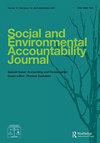公共部门的可持续性和问责制:合法性视角
Q2 Business, Management and Accounting
Social and Environmental Accountability Journal
Pub Date : 2022-10-21
DOI:10.1080/0969160X.2022.2136907
引用次数: 0
摘要
对大多数国家来说,公共部门(与私营部门和第三部门相比)对经济、社会和环境有着巨大的影响(CIPFA,2021)。鉴于公共部门(既是公共服务提供者又是监管机构)的双重作用以及全球环境和社会挑战的紧迫性,人们普遍认为,公共部门组织有责任和潜力推动可持续发展。公共部门的可持续性整合、绩效管理和信息披露引起了世界各地学者、政策制定者和从业者的注意,他们认识到公共部门运营商需要对广泛的利益相关者公开负责。此外,合法性理论长期以来一直被应用于可持续性和问责制文献中,以解释组织实施可持续性战略和问责制披露的动机。合法性被视为组织生存所必需的资源(Deegan,2014),这会对预期的组织行为产生压力(Connolly和Kelly,2020)。此外本文章由计算机程序翻译,如有差异,请以英文原文为准。
Sustainability and Accountability in Public Sector: A Legitimacy Perspective
For most nations, the public sector (in contrast to private and third sectors) has an enormous impact on the economy, society, and environment (CIPFA, 2021). It is widely acknowledged that public sector organisations (PSOs) have the responsibility and potential to advance sustainable development given the dual role of the public sector (as both a public service provider and a regulator) and the urgency of global environmental and social challenges. The landscape of sustainability integration, performance management, and disclosure in the public sector has attracted the attention of academics, policymakers, and practitioners worldwide, in recognising that PSOs need to be publicly accountable to a wide range of stakeholders. Moreover, legitimacy theory has long been applied within the sustainability and accountability literature to explain organisations’ motivations for sustainability strategies and accountability disclosures. Legitimacy is viewed as a resource necessary to the survival of an organisation (Deegan, 2014), which generates pressures regarding expected organisational behaviour (Connolly and Kelly, 2020). Further, this
求助全文
通过发布文献求助,成功后即可免费获取论文全文。
去求助
来源期刊

Social and Environmental Accountability Journal
Business, Management and Accounting-Accounting
CiteScore
3.90
自引率
0.00%
发文量
16
期刊介绍:
Social and Environmental Accountability Journal (SEAJ) is the official Journal of The Centre for Social and Environmental Accounting Research. It is a predominantly refereed Journal committed to the creation of a new academic literature in the broad field of social, environmental and sustainable development accounting, accountability, reporting and auditing. The Journal provides a forum for a wide range of different forms of academic and academic-related communications whose aim is to balance honesty and scholarly rigour with directness, clarity, policy-relevance and novelty. SEAJ welcomes all contributions that fulfil the criteria of the journal, including empirical papers, review papers and essays, manuscripts reporting or proposing engagement, commentaries and polemics, and reviews of articles or books. A key feature of SEAJ is that papers are shorter than the word length typically anticipated in academic journals in the social sciences. A clearer breakdown of the proposed word length for each type of paper in SEAJ can be found here.
 求助内容:
求助内容: 应助结果提醒方式:
应助结果提醒方式:


